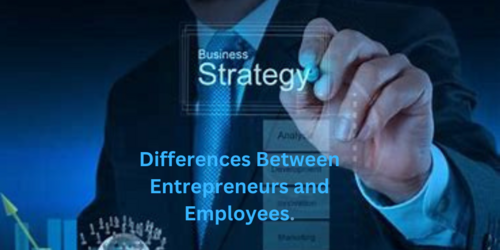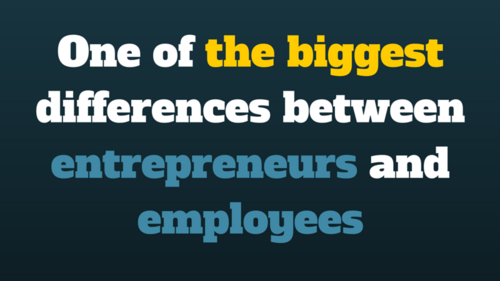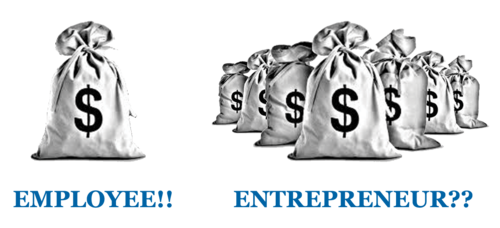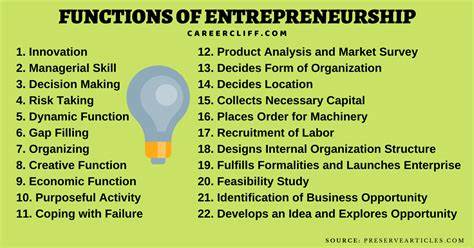
Differences Between Entrepreneurs and Employees.

Traditional employment and entrepreneurship are two ways to generate income throughout your career. The subject of your work as an employee may compare to that of an entrepreneur, while your work environment, independence and schedule flexibility may differ. Learning how employees and entrepreneurs compare and contrast can help you identify which type of job is most ideal for you. In this article, we define employment and entrepreneurship and list the similarities and differences between them.
So, what are some key differences between employees and entrepreneurs? 1. Employees seek direction while entrepreneurs create a path. Employees tend to seek help when a problem arises at work. Entrepreneurs create the solutions that keep the organization moving forward. 2. Employees do while entrepreneurs listen.
Employment is the act of working for a company to receive compensation in return. Companies build a workforce by hiring professionals to fill certain roles and complete tasks that can benefit the business. Employees may participate in training programs to learn how to fit into their employer's corporate culture. They may also receive payment on a consistent basis, such as weekly, biweekly or monthly.
Entrepreneurship is the act of starting a business to make it profitable. The business owner makes the proper investment to control the operations, and they spearhead the services the business provides. Entrepreneurs may work by themselves or hire staff members to work alongside them in the company. They use their expertise to attract clients and participate in projects that contribute to their industries. Their pay structure may depend on the structure of the businesses they've built.
Ever wondered what it takes to make the leap from employee to entrepreneur?
It takes some key shifts in mindset, habits, and comfort levels–resulting in some key differences between the types of people who thrive as employees and succeed as entrepreneurs.
Some people generalize employees as followers, and entrepreneurs as leaders. Yet there are entrepreneurial employees, and there are entrepreneurs who know when it’s time to follow someone else’s lead. The difference between these two types of people isn’t always clearly defined.

So, what are some key differences between entrepreneurs and employees ?
1. Employees seek direction while entrepreneurs create a path.
Employees tend to seek help when a problem arises at work. Entrepreneurs create the solutions that keep the organization moving forward.
2. Employees do while entrepreneurs listen.
It’s the employees who get most of the work done in any organization. But in order for them to do it well, the entrepreneur at the helm has to listen to their needs and ensure they maintain a productive and positive work environment for staff.
3. Employees take fewer risks while entrepreneurs live for them.
While doing things the safest way can actually be good for an organization, it takes a risk-tolerant entrepreneur to believe in and build the organization in the first place.
4. Employees are often specialists while entrepreneurs are generalists.
Entrepreneurs need to know a little bit about a lot of things, in part so they can empower the specialist employees who work for them. In fact, a Swiss-German study found that specialists tend to be employees for life, and in fact prefer that role.
5. Employees get paid for their role while entrepreneurs get paid for results.
Entrepreneurs are sometimes the last to get paid in a company, because their compensation is tied directly to performance and profit.
6. Employees love holidays because they get the day off while entrepreneurs do because they can work all day with few interruptions.
A lot of entrepreneurs rejoice when holidays come along, not because they’re taking well-deserve time off, but because they can be productive all day without being disrupted or distracted.
7. Employees appreciate steady employment while entrepreneurs are comfortable without job security.
Entrepreneurs know that it’s risky to build a business and that they must sacrifice steady employment in order to build the company.
8. Employees follow rules while entrepreneurs break them.
It’s a strange paradox, but to create a successful business an entrepreneur has to disrupt something, break a rule, or change the game. But in order to keep the entrepreneur’s company going, the employees need to be there to uphold the new status quo.
9. Employees are responsible for some decisions while entrepreneurs are responsible for them all.
Whether positive or negative, the entrepreneur is ultimately burdened with the impact of decision-making at all levels of the organization.
10. Employees execute tasks while entrepreneurs plan.
An employee can take work day by day, whereas an entrepreneur has to consider how well the tasks are being performed relative to the long-term plan for the business.
11. Employees like structure while entrepreneurs like infrastructure.
While employees generally prefer to have a defined range of responsibility, entrepreneurs consider how each person’s role contributes to the business–and its growth–as a whole.
12. Employees work to a schedule while entrepreneurs create their own.
If they don’t develop strong time management skills, entrepreneurs can burn themselves out working too many hours each week.
13. Employees are always working while entrepreneurs are always selling.
And it can be exhausting. Entrepreneurs have to sell investors on their ideas, clients on the value of their products, staff on the benefits of working there, and even their families on why they’re running a business.
14. Employees can enjoy more social interaction while entrepreneurs often work in a silo.
Entrepreneurship can get lonely, especially at the beginning. It helps to have a mentor or other group to bounce ideas off at the early stages of starting a business.
15. Employees dislike failure while entrepreneurs embrace it.
Failure means learning, and entrepreneurs know that failure is more likely than success–and failure can lead to success. Employees would rather not fail at their jobs as it can lead to fear of losing the steady employment they value.

Here are 15 key differences between being an employee and being an entrepreneur:
Compensation for employees depends on their employment type. If they have a salary, then their paychecks contain a fixed amount. If they receive an hourly wage, then the employer processes payments based on the number of hours the associates worked. Employees can also receive income bonuses, such as commission and overtime pay. The compensation for entrepreneurs depends on the rates they charge for their services and the number of clients they're servicing. Their incomes may fluctuate based on the busyness of their work schedules.
Since entrepreneurs work for themselves, they often have the freedom to design their own work schedules. For example, they may prefer working during the evening over the morning, or they may be available three days a week. Employees work on a schedule that their employers provide, which can be during the company's standard business hours. They may also have shifts that their immediate supervisors create.
The role of a traditional employee may be more secure than an entrepreneur. Employees can enjoy a fixed income and stable work schedule, and their position may require them to fulfill the same tasks. For instance, a customer service representative may work for the same department store for 30 years. Entrepreneurs operate their own businesses, and their client management can influence the stability of their roles. For example, a professional who completes fewer projects can cause the trajectory of their careers to change. It's also possible for entrepreneurs to find stability once their businesses become more established.
As business owners, entrepreneurs may make all the decisions regarding their careers. For example, they may decide when to expand their clientele or create a new work schedule. The decision-making role for employees depends on their rank in the organizational hierarchy. A professional in an executive position may make more choices than an entry-level coworker. Employees may also consult with their colleagues for their decision-making and justify their conclusions to their teams. Entrepreneurs may not explain their choices to anyone if they work by themselves or have founded their own workforce.
Entrepreneurs may have more independence in their roles than employees. As their own immediate supervisors, entrepreneurs can work how they want to and can hold themselves accountable for their work conduct. Employees may undergo performance reviews, where they receive feedback from managers on how they can improve. Their workflow may rely on the employer's standards.
Related: What Is Entrepreneur Management? Definition and Benefits
Another difference between employment and entrepreneurship is the benefits package. When professionals receive a job offer, the company may agree to provide a health insurance plan, a retirement plan and a signing bonus, for example. Benefits can persuade a professional to accept the offer. When entrepreneurs find new clients, they may not receive perks outside of their normal compensation. For example, a business owner may pay for private health insurance because they don't have a traditional employer.

Entrepreneurs may have greater responsibilities than traditional employees. Along with administering the services they provide to clients, business owners may meet with potential investors and perform maintenance at their office meetings, for example. They may also spearhead promotional efforts to raise awareness of the business to the public. Employees, especially those who work at the entry level, may only be responsible for the tasks that apply to their specific job titles.
Being an entrepreneur can require a hefty financial investment. The expenses may include equipment, paid promotional campaigns and rent and maintenance fees for office space. It's often the entrepreneur's responsibility to provide the materials that keep their business functioning. An employee may have no financial responsibility since the company they work for provides everything for them to meet the employer's expectations.
While it's possible for employees to multi-task with several projects, the diversity of their work relies on the companies that employ them. For instance, a professional's workday may only be as versatile as the number of clients the company seeks. They may also find it challenging to change their assignments if the company is steering the direction. Entrepreneurs are in control of their own projects, and their responsibilities may be so expansive that their schedules are more diverse than employees. They have the freedom to enforce changes and oversee new initiatives.
To fulfill their roles, employees and entrepreneurs may work in different work environments. Employees may work in an office building that the employer owns, and they may have a designated area to complete their assignments. Some associates may telecommute, but their employers may require disclosure about the location of their workspaces. Entrepreneurs can control where they work, which means they can opt to work in an office that they rent or own, or they can work from home.
The career of an entrepreneur can have a higher risk than that of an employee. To own a successful business, owners invest time and resources on their own. It can be challenging to predict if the business runs well enough to yield a livable income and professional fulfillment. Employees may only devote time to their roles, and they can have the flexibility to pursue other job opportunities. With traditional employment, the company founder is taking the risk, not members of its workforce.
.jpg)
Andries van Tonder is a Digital Marketer and an Entrepreneur with over 40 Years of experience in Business and Marketing. Business is my passion and I have established myself in multiple industries with a focus on sustainable growth.
You will generally find me online on Facebook, Twitter, WebTalk, Instagram & Markethive
